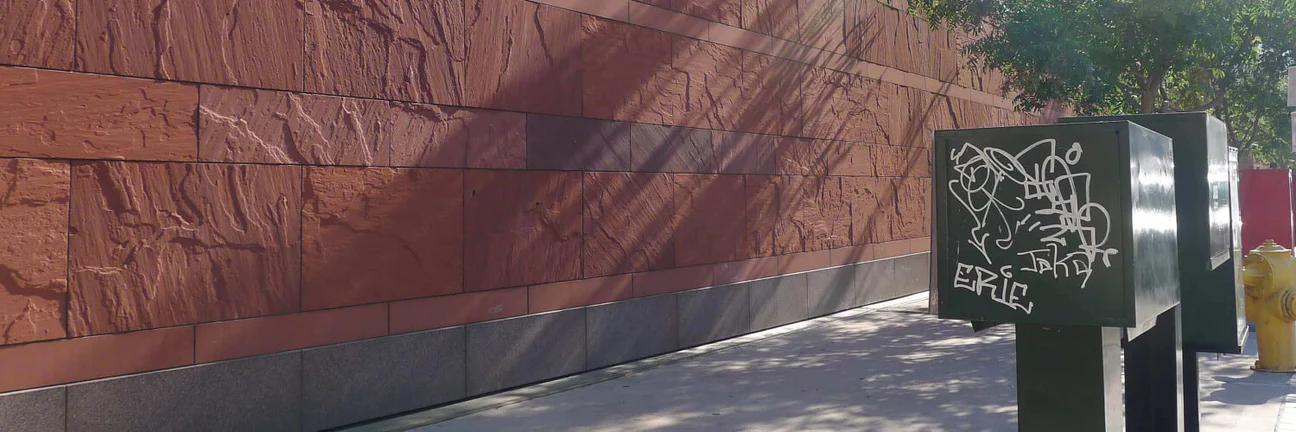First, A quick word on so called permanent anti-graffiti coatings.
Over the past 30 years we have seen many anti-graffiti coatings come onto the scene very often touting the latest and greatest technology in 'permanent' anti-graffiti coatings. They invariably promise to make cleaning graffiti easy in the future, and often come at great cost to building owners, having to be applied under the exact right circumstances, by contractors who have been trained or licensed to use the product.
These sorts of permanent coatings are usually an unnecessary expense, and in many cases are specified in totally inappropriate situations. They often change the appearance of natural building surfaces with a gloss or semi-gloss finish.
They all work to some degree at least in the initial stages, but after repetitive cleaning, continued exposure to UV sunlight, and other environmental factors such as efflorescence on buildings, they often turn cloudy, peel or delaminate in some areas.
When
these sorts of coatings degrade, it
can actually make it more difficult
to clean graffiti in the long term.
If for any reason in the future you
want to remove the coating you can
have a monster on your hands trying
to get them off. Painting over them
can be difficult, if not impossible.
With
our system of
products, we can
remove 100% of graffiti without any
difficulty on virtually all building
surfaces, so in most cases we would
rather see no coating applied on a
wall, rather than the wrong one.
Problems are most likely going to occur in 2-3 years after applying a coating. This is why you need to carry a big stick and tread very carefully when considering applying any so-called permanent coating to a building surface.
Still,
there is a genuine need for low-cost
graffiti protection on certain
surfaces, to ease the burden on
maintenance by speeding up removals.
This means protecting important
building surfaces that were never
intended to be painted over. These
include historic or delicate buildings
and sculptures, porous/ decorative
feature walls and structures made from
raw timber, split face rock, cinder
block, lime stone and brick.
For these situations we recommend our World’s Best Graffiti Coating (WBGC)specifically designed for the protection of natural building surfaces against graffiti, pollution and grime. This amazing product is a virtually invisible and long lasting anti-graffiti coating guaranteed to work perfectly in conjunction with the World’s Best Graffiti Removers.
Unlike permanent coatings, if you ever have to remove our coating for any reason you can remove it with boiling hot water at pressure (ie: a hot water pressure washer) or ‘chemically’ using our Bare Brick, Stone & Masonry Graffiti Remover and a cold water pressure washer.
World’s Best Graffiti Coating is totally matte in finish and always leaves building surfaces looking perfectly natural, the way they were intended to look. In the event of graffiti occurring after you have applied WBGC, you can easily remove the graffiti either with hot water or using our removers WBGC can then be quickly and seamlessly reapplied for future protection, even if the wall is still damp. The coating has been tested on buildings around the world for over 20 years. It is a pleasure to apply and makes removing graffiti quick and easy every time. There are many opportunities to supply and apply this coating in new building construction, as well as ‘after’ removing graffiti from existing buildings. In fact, once the coating is applied to a building, removing graffiti is so easy, that many contractors will guarantee removals for a year or more.
The
Truth about Permanent Anti-Graffiti
Coating
3
Golden Rules
1) The best coating for paint is paint. Although it’s possible to remove larger graffiti from a painted surface, it is often far quicker and easier to simply color match and paint over. Smaller graffiti can be easily removed with our Sensitive Surface Graffiti Remover or Graffiti ‘Safewipes’, without the need for specialized protective coatings.
2) Any coating you are thinking of specifying must be proven to work as intended, and have stood the test of time without behaving badly (which ultimately would disappoint your customer).
3) Unlike permanent coatings, if for any reason in the future you need to remove this coating from a building, you must be able to do this quickly and inexpensively without the risk of damage to the building surface.

